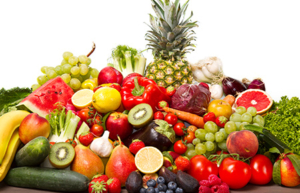University College of London: Eating 7 or More Servings Reduces Risk of Premature Death by 42%
Eating seven or more portions of fruit and vegetables a day reduces your risk of death at any point in time by 42% compared to eating less than
one portion, reports a new UCL study.
A new peer reviewed study conducted by the University College of London showed that people who ate seven or more servings of fruits and vegetables per day reduced their risk of premature death by 42%. Consuming that many servings of produce each day reduced the risk of death from cancer by 25% and heart disease by 31%. This research was published in the Journal of Epidemiology and Community Health and studied the eating habits of over 65,000 people over 12 years.
The study also examined consumption of lesser amounts of produce each day and found that risk of premature death by any cause is reduced by 14% if you eat one to three servings a day; 29% for three to five servings; and, 36% for five to seven servings.
“We all know that eating fruit and vegetables is healthy, but the size of the effect is staggering,” says Dr. Oyinlola Oyebode of UCL’s Department of Epidemiology & Public Health, lead author of the study. “The clear message here is that the more fruit and vegetables you eat, the less likely you are to die at any age.
This is yet another study that confirms the findings of decades of nutrition research about the benefits of eating a diet rich in fruits and vegetables – those studies were largely conducted using conventional produce. It also underscores the importance of public health initiatives to increase daily consumption of both organic and conventionally grown produce.
A complimentary peer reviewed paper regarding food safety was also published the same week as this consumption study. This study, conducted by Oxford University and published in the British Journal of Cancer, found that there was no difference in cancer rates of middle aged women who consumed organic foods compared to women who ate conventionally grown foods.
This research was sponsored by a cancer research charity in the United Kingdom. According to the charity’s health information manager, Dr. Claire Knight: “This study adds to the evidence that eating organically grown food doesn’t lower your overall cancer risk. Scientists have estimated that over 9% of cancer cases in the U.K. may be linked to dietary factors, of which almost 5% are linked to not eating enough fruits and vegetables. So eating a balanced diet which is high in fruits and vegetables – whether conventionally grown or not – can help reduce cancer.”
These studies show the simplest advice for consumers is also the best advice – eat more organic and conventional fruits and vegetables every day for better health and a longer life. Both are safe and the right choice is to always eat more.



